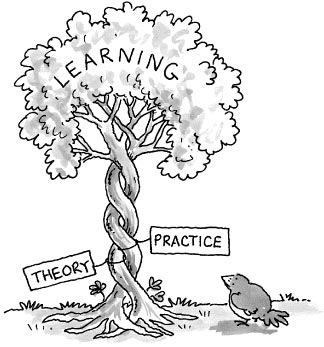Practical vs Theoretical Knowledge:
 http://elasjoliedotcom.files.wordpress.com/2011/03/theory_practice_tree.jpg
http://elasjoliedotcom.files.wordpress.com/2011/03/theory_practice_tree.jpg
Practical knowledge is knowledge that is acquired by day-to-day hands-on experiences. In other words, practical knowledge is gained through doing things; it is very much based on real-life endeavors and tasks. On the other hand, theoretical knowledge teaches the reasoning, techniques and theory of knowledge. While practical knowledge is gained by doing things, theoretical knowledge is gained, for example, by reading a manual.
The Value of Theoretical And Practical Knowledge – Vanseo Design
A couple of recent guest posts have discussed the value of 4 year and online degrees as compared to learning on your?
vanseodesign.com
Real life examples:
Practical knowledge and theoretical knowledge are two completely distinct approaches to knowledge. While theoretical knowledge may guarantee that you understand the fundamental concepts and have know-how about how something works and its mechanism, it will only get you so far, as, without practice, one is not able to perform the activity as well as he could. Practical knowledge guarantees that you are able to actually do something instead of simply knowing how to do it
 http://3.bp.blogspot.com/-xQYwXHldYWM/TbVE8vT0YJI/AAAAAAAAD10/ooNnCkNyy-E/s400/study_hard.jpg
http://3.bp.blogspot.com/-xQYwXHldYWM/TbVE8vT0YJI/AAAAAAAAD10/ooNnCkNyy-E/s400/study_hard.jpg
Theoretical knowledge: (know THAT)
- I know THAT I can bake a cake
- I know THAT to ride a bike I must pedal and have good balance
- I know THAT to ride a horse, I must have strong legs and hold on tight.
 https://aos.iacpublishinglabs.com/question/aq/700px-394px/fast-average-person-ride-bike_cf053029272716e0.jpg?domain=cx.aos.ask.com
https://aos.iacpublishinglabs.com/question/aq/700px-394px/fast-average-person-ride-bike_cf053029272716e0.jpg?domain=cx.aos.ask.com
Practical knowledge: (know HOW)
- I know HOW to ride a bike
- I know HOW to play soccer
- I know HOW to ride horses
Real life situation ? THEORETICAL KNOWLEDGE:
When I was 8 years old, my mother decided that it was time for me to ride my bicycle but, this time, without the training wheels. She told me what exactly I had to do ? spin the wheel with your left leg, then right one, and repeat this over and over again ? and taught me how to use the brakes in case I needed to stop the bike, and taught me about how I should balance myself in the bike. Confident about my cycling skills, I decided that the time had come to finally ride my bike, as there was nothing I had to fear ? my mother had just explained everything I needed to know to be able to succeed in riding my bike. Or at least that?s what I thought. As soon as I started riding my bike, I completely lost my balance, didn?t stop the bike in time and crashed into a tree. How come? Very simply, I had all the theoretical knowledge and ?know-how? of riding a bike; however, I had no practical knowledge whatsoever.
Real life situation ? PRACTICAL KNOWLEDGE:
During the Summer of 2015, I participated in a Summer Program about Mathematics and the Sciences. However, I had no theoretical knowledge on Chemistry, as I had never taken the class at school. Therefore, when my teacher assigned me a task on Titration (neutralization of an acid), my partner and I, at the end of the lab, knew all about the titration of acids and bases, what occurred, when and why. If you asked me anything about how to perform the lab itself, I?d be able to answer all your practical questions. Confident in my Chemistry skills, I began my Chemistry SL Y1 class last August with my head high, thinking I was ahead of others. However, it was quick to realize that, though I had so much practical knowledge, I was unable to describe why the things that happened were happening. I did not understand the fundamental concepts, reasons or theory behind the experiment that I knew how to direct. I had a lot of practical knowledge, but, on the other hand, very little theoretical knowledge.
- The thought that they are independent is called anti-intellectualism.
- The thought that they are dependent is called intellectualism.
Intellectualism: Theoretical and practical knowledge are interconnected and complement each other ? if one knows exactly HOW to do something, one must be able to apply these skills and therefore succeed in practical knowledge.
Anti-intellectualism:Theoretical and practical knowledge are independent ? just because one has theoretical knowledge and knows the procedure doesn?t mean one is ABLE to play the game. This can be seen in sports ? one may know the rules of the game and what to do at what point in the game, it doesn?t guarantee that one knows HOW to play.
Word count: 751


